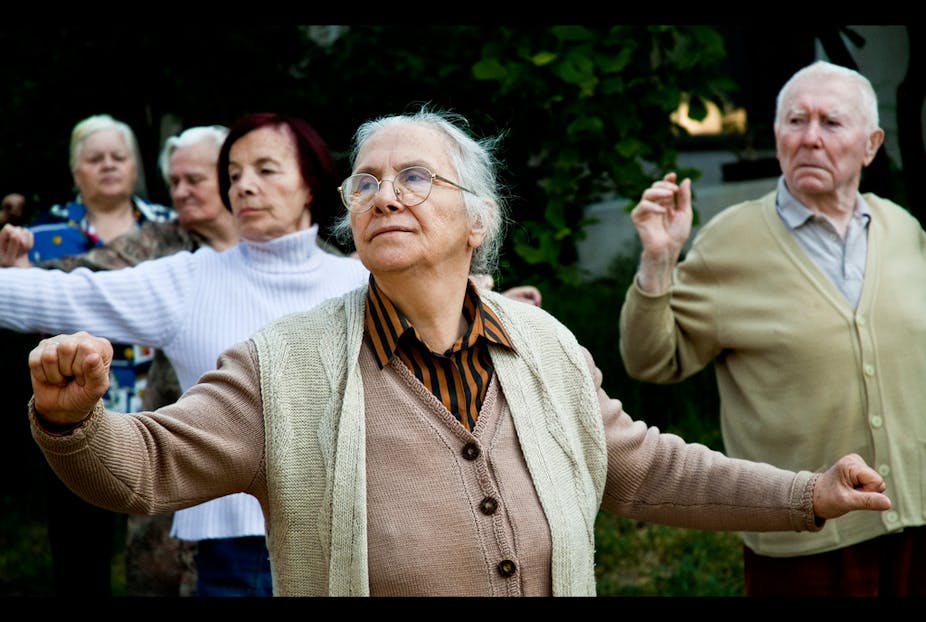The average age of Australian population is 38, up from six years younger 20 years ago and still rising. Like other western countries, Australia has responded to this changing demographic with increased emphasis on community care over expensive residential care and increasing choices in aged care.
The latest Productivity Commission Report on Caring for Older Australians takes this trend towards community care and increasing consumer choice further.
It does so by setting out a plan for phasing out limits on the number of residential places and community service packages and restructuring residential care to allocate subsidy according to need.
Need for research
The aged care sector needs better links with the research sector to sure the quality of care it’s providing is linked to the best research evidence available.
There was recognition throughout the Report of the need for a solid evidence base upon which to build policy and best practice in aged care.
It also noted the difficulty the sector has in accessing data already collected by a number of government agencies.
The lack of capacity for research into aged care is noted, as is the need for research into the effectiveness of existing programs, preventive approaches (especially in dementia), and greater consumer involvement in research programs.
But the recommendations that flow from this analysis focus mainly on the proposed Australian Aged Care Regulatory Commission’s (AACRC) role as a national “clearinghouse” for aged care data.
And that research findings, including those commissioned by the Department of Health and Ageing, should be made public in a timely manner.
We need to go further by developing the links between the aged care sector and universities to build on the quality of care improvements that have taken place in the last 20 years.
Development of initiatives such as teaching nursing homes and encouraging best practice initiatives will enable research translation.
Increasing professionalization of the sector will come from valuing ageing as a professional career in universities.
Lack of funding
The main sources of research-initiated funding for aged care research is the National Health and Medical Research Council (NHMRC).
The NHMRC’s main focus is on biomedical research and on specific disease entities, such as cancer or cardiovascular disease. Research into ageing and aged care doesn’t fit well within this disease or body-systems based model.
Ageing affects all bodily systems but is also a psychological and social phenomenon.
So research into ageing and aged care requires collaboration between a range of disciplines, and cooperation with older people themselves.
Sadly, the current funding system doesn’t have the capacity to support translational research.
While the teaching hospital model is well established and the teaching nursing home model has existed for decades, the links between aged care providers and the academic research sector have not grown fast.
The government should facilitate this and be proactive in developing better links between aged care service providers – both government and non-government – and researchers.
Such links would bring the latest research findings to service providers.
Participation in research can improve morale of staff, provide opportunities for consumer involvement in research projects and improve the quality of the services as well as improving the quality of research.
Researchers can be more closely aligned with priorities of service providers and have a better understanding of the barriers and facilitators to providing aged care.
Involvement in research has the potential to produce cost savings for aged care providers through quality improvement.
The teaching nursing home model can be extended to other sectors of the aged care service system such as community care but services need adequate compensation for involvement in teaching and research.
Government role
The government needs to encourage service providers to understand the valuable role that teaching and research can have in quality improvement in the short term, as well as longer-term benefits of contributing to the health of the population.
It is also essential to evaluate programs and services to see if they are effective, meeting their objectives and result in improved outcomes for older people.
This is currently done for some programs and services and not others. For example, the Dementia Initiative has been subject to comprehensive evaluation but other mainstream community services, such as Community Aged Care Packages (CACPS) and Extended Aged Care in the Home (EACH) haven’t been evaluated to see if they are cost effective compared to residential care.
Or whether they have result in improved outcomes for older people and their carers compared to those who don’t receive these services.
Evaluation research also needs government support to enable strong designs including randomised controlled trials of new government programs.
While developing community aged care options and increasing consumer choice for various models of care are very important, we need to make ensure that they don’t compromise the quality of available choices.

